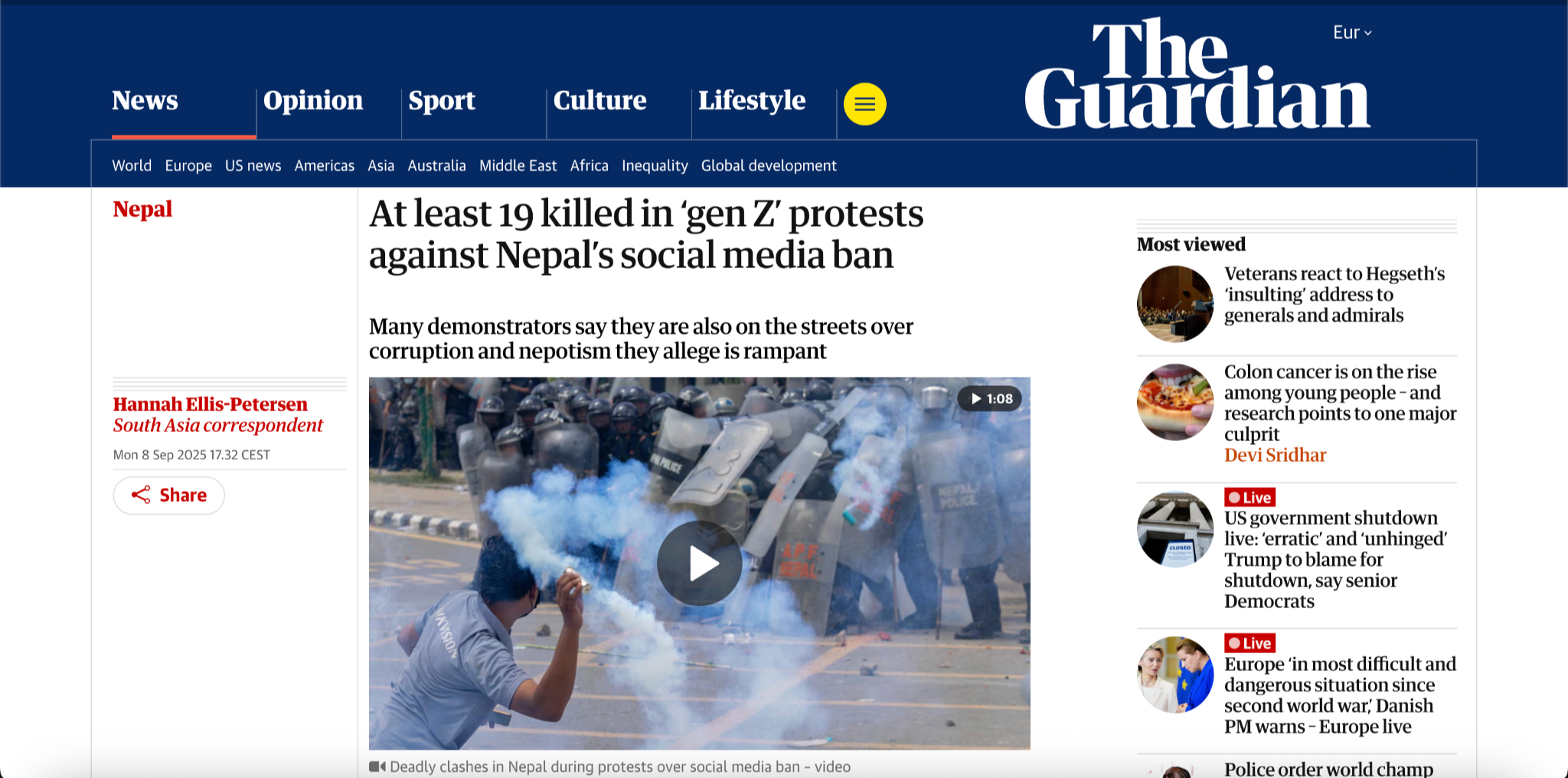© The Guardian — Nepál zakazuje 26 sociálnych médií vrátane X, WhatsApp a YouTube (8. septembra 2025)
Za hranicami označenia
V posledných rokoch sa veľa diskutovalo o vnímaní našej éry ako éry permakrízy a rovnako veľa sa diskutovalo o masových mobilizáciách na medzinárodnej úrovni, mobilizáciách so silným dopadom, ktoré sú prezentované ako mládežnícke, zabalené ako „protesty generácie Z“, často s optimistickým tónom, ktorý môže podnietiť utopickú diskusiu, a niekedy sú spojené s érou permakrízy, nie s krízou (κρίσις) v klasickom zmysle slova, ale skôr s prevratom.
Označenie „protesty generácie Z“ sa používa skôr ako pomôcka k pochopeniu generácie než samotných hnutí, pričom ich, samozrejme, spája s digitálnym zrodom, uznaním horizontálnej organizácie a moralizovaným hnevom. Hoci je toto zovšeobecnenie skôr príťažlivou značkou, riskuje, že tieto hnutia bude propagovať ako „depolitizované antisystémové“ a nie ako hnutia s rozmanitým obsahom, čím zatieni interdisciplinaritu účastníkov a prehliadne štrukturálne príčiny, ktoré protest spúšťajú – pričom najnovším a najcharakteristickejším príkladom je prípad Nepálu, ktorý bol v medzinárodných správach spočiatku prezentovaný ako revolúcia proti zákazu sociálnych médií.
S nástupom realpolitiky ako filtra pre vnímanie vecí upadá utopická rétorika. Samozrejme, to, čo táto rétorika hľadá a čo realpolitika zvažuje, je ďalšia diskusia s dôsledkami pre obmedzenie demokratického priestoru v prospech nepravidelnej stabilitokracie . Pokiaľ ide o generáciu Z, nie je to „budúcnosť“, ale už rozhodujúci faktor v súčasnosti. Je to generácia, ktorá využíva rýchlosť a prepojenosť platforiem na prekročenie geografických a inštitucionálnych hraníc a organizovanie hybridných foriem konania, ktoré končia na uliciach. Jej veková identita ako jadra „osvietenej generácie“ však môže zakryť drsnú realitu politickej ekonómie, ktorá plodí hnev tejto generácie: ekonomická neistota, rastúca nerovnosť, štát ako veľký brat spolu s politickými voľbami, ktoré vedú k úpadku životného prostredia a inštitucionálnej nespoľahlivosti, definujú rámec, ktorý tieto hnutia poháňa k akcii. Je zrejmé, že vnímanie týchto mládežníckych hnutí pod označením „Generácia Z“ ako interpretačného paspartu je dosť neadekvátne.
Tieto hnutia občas preukázali svoj úspech, napríklad stiahnutím návrhov zákonov, ale ich pohltenie starým politickým systémom zostáva neustálou hrozbou. Návrhy na inkluzívne, demokratické a kolaboratívne reformy sú odsúvané na vedľajšiu koľaj krátkodobými protikorupčnými kampaňami a hnutiami podobnými záchrancom, ktoré sa zaoberajú skôr symptómami ako základnými príčinami.
Protestujúci generácie Z sa v Lime, hlavnom meste Peru, stretávajú s políciou, keďže napätie narastá. Protesty vyvolal hnev kvôli korupčným škandálom, ekonomickej neistote a ďalším faktorom pic.twitter.com/PFtwa2WSya
— Reuters (@Reuters) 29. septembra 2025
V Európe sa zdá, že mladí ľudia sa „neodťahujú“ od politiky, ale pretvárajú kanály participácie, od vzájomnej pomoci a umeleckého protestu k digitálnym naratívom požadujúcim rovnaký prístup k rozhodnutiam a nie symbolické „mládežnícke kútiky“. Tento posun je rozhodujúci z hľadiska ich koncepčného spracovania, pretože nejde o „mládež ako tému“, ale o „mládež ako metódu“, metodiku, ktorá podporuje konfrontačnú kreativitu a neuprednostňuje „bezpečné“ cesty participácie. Srbsko je dnes laboratóriom limitov a možností študentského hnutia, ktoré začalo požiadavkami na zodpovednosť a prerástlo do širšieho občianskeho boja, čím sa „škandál“ premenil na širšiu kritiku nerovnosti a korupcie.
Záverom nie je opustiť termín „Generácia Z“ – ide o jeho dekolonizáciu. Ako deskriptívny koncept môže byť užitočný, ale ako interpretačná dogma zahmlieva triedne, rodové, etnické postavenie, rozdelenie medzi centrom a perifériou, ako aj architektúru moci (právo, polícia, médiá, trhy), pričom srbský prípad nám pripomína, že označenia sa ľahko nehodia do pluralitných, konkurenčných procesov.
Problém zjednodušovania
Koncept „protestov generácie Z“ je atraktívny pre médiá a politickú komunikáciu, pretože ponúka zdanlivo priamočiary a transparentný rámec pre interpretáciu so zameraním na mladšiu generáciu občanov. Práve toto použitie konceptu „generácie“ ako interpretačného filtra však posilňuje stereotypné naratívy, namiesto toho, aby uznávalo rozmanitosť a komplexnosť týchto hnutí.
Toto zjednodušovanie vedie k vnímaniu identickej uniformity, čo naznačuje spoločnú skúsenosť a spoločnú politickú predstavivosť, zatiaľ čo v skutočnosti mladí ľudia zúčastňujúci sa protestov pochádzajú z rôznych sociálnych vrstiev, tried, pohlaví a kultúrneho prostredia, čo robí z uznania vnútornej rozmanitosti predpoklad spravodlivosti. Je to preto, že eliminácia heterogenity v mene „generácie“ vedie k forme „politického umlčania“ tých, ktorí nezodpovedajú stereotypu, ale zároveň zdôrazňuje problém politickej kapitalizácie, pretože ak sa tieto otázky nakoniec presunú z ich politického obsahu do pseudodemografického naratívu, mocenské vzťahy, ktoré aktivizujú hnutia, sú odsunuté na vedľajšiu koľaj.
Táto ťažkosť s politickou kapitalizáciou hnutí súvisí s tým, ako sú vnímané – pretože keď zostávajú „protestmi generácie Z“, sú definované v apolitickom naratíve, ktorý ich prezentuje skôr ako generačný prejav „hnevnosti“ a menej ako vedomú politiku na jednej strane, zatiaľ čo na druhej strane podceňuje ich limity, zaťažuje ich utopickými preháňaniami ako predzvesťami radikálne novej spoločnosti, bez toho, aby sa uznalo, že utópia neexistuje; ale to, čo existujú, sú problémy, s ktorými sa musia spoločnosti vysporiadať na politickom horizonte. Nakoniec, keď príde nevyhnutné sklamanie, hnutie je stigmatizované ako neúspešné. Celkovo rámec „protestov generácie Z“ funguje ako schematizácia, ktorá depolitizuje alebo povrchne zaobchádza s problémom, neosvetľuje zložitosť kolektívnej akcie, ale skôr ich začleňuje do kategórie, ktorá je prístupná mediálnej komunikácii, ale má chudobnú teoretickú hodnotu.
„Eliminácia heterogenity v mene „generácie“ vedie k forme „politického umlčania“ tých, ktorí nezodpovedajú stereotypu, ale zároveň zdôrazňuje problém politickej kapitalizácie, pretože ak sa tieto problémy nakoniec presunú z ich politického obsahu do pseudodemografického naratívu, mocenské vzťahy, ktoré aktivizujú hnutia, sú odsunuté na vedľajšiu koľaj.“
Tisíce demonštrantov generácie Z vyšli do ulíc Madagaskaru na protest proti korupcii.
Protestujúci ignorovali zákaz protestov, ktorý vydala vláda, po výpadkoch vody a elektriny. pic.twitter.com/HP85DJF4EL
— Zóna faktov o Afrike (@AfricaFactsZone) 27. septembra 2025
Už samotný názov je klasifikáciou reality; charakterizácia protestu ako „mladistvého“ ho zaraďuje do špecifického hodnotového rámca a tento rámec je dvojaký: zdôrazňuje sviežosť a dynamiku mladosti, ale zároveň ho často redukuje na dočasný, takmer frivolný výbuch emócií. Výsledkom je vytvorenie mýtu o mladosti, ktorý nesie pozitívne aj negatívne konotácie, ale negeneruje politický dialóg s vážnymi politickými dôsledkami, kde sú mladí ľudia zbavení svojho postavenia politických subjektov, čím sa menia na masu bez stabilnej identity, ktorá potrebuje interpretáciu a kontrolu. Držitelia moci majú záujem prezentovať protesty ako výsledok „rebelskej“, „naivnej“ generácie, povedzme rebelov bez príčiny – bagatelizujú požiadavky, kritiku inštitucionálnej korupcie, nerovnosti, obvinenia z policajného násilia. Ak je nakoniec politika, koncept politiky, konštruovaný okolo konceptu priateľ-nepriateľ , potom tým, že tieto hnutia vnímame ako vedľajší produkt generácie Z, ich odstraňujeme z tohto spektra a podkopávame ich ako „sociálny šum“.
Nakoniec by sme si mali uvedomiť, že rámcovanie „protestu generácie Z“ vytvára postpolitickú mytológiu, vďaka ktorej sú protesty stráviteľné v naratíve o „rebelskej generácii“ a zároveň ich robí postradovateľnými. Kritika „protestu generácie Z“ nie je len literárna; je politická a umožňuje nám zamyslieť sa nad tým, ako podmienky verejného diskurzu určujú, čo sa chápe ako politická činnosť a kto sa považuje za občana. Generačné označenie odvádza pozornosť od politických a sociálnych požiadaviek a transformuje zložité hnutia na kultúrny fenomén, ktorý sa dá ľahko skonzumovať a rýchlo zabudnúť, kde sa „generačná“ vzbura môže cez noc stať virálnou a do nasledujúceho týždňa už bude asimilovaná do spravodajského cyklu, čím ustúpi ďalšiemu trendu.
„Namiesto dialektického fungovania a vedúceho ku konsenzu alebo kreatívnej syntéze sa teda ideologický pluralizmus môže stať poľom zásadných rozdielov a vnútornej fragmentácie. Generačná identita, namiesto posilňovania postavenia, môže obmedzovať horizont politickej predstavivosti, ak nie je prepojená s jasnými stratégiami pre spoločenskú zmenu.“
Problémom samozrejme nie je len odmietnutie nálepiek, voči ktorým musíme byť kritickí, ale skôr potreba hnutí rozvíjať formy organizácie a politickej predstavivosti, ktoré presahujú nálepky a naratívy, ktoré sú im vnucované, vytvárajú štruktúry, ktoré pretrvajú aj po počiatočnom výbuchu, vymýšľajú spôsoby, ako vyvíjať neustály tlak na štát a inštitúcie, a budujú medzigeneračné a medzitriedne aliancie. Postpolitika je oblasť, kde slová a obrazy nahrádzajú konanie, takže to, čo musíme urobiť, je vrátiť sa k konaniu ako k niečomu, čo vytvára realitu. To znamená predstaviť si politiku nie ako „moment mladíckeho spontánneho výbuchu“, ale ako dlhý proces formovania nových foriem kolektivity a nových spôsobov participácie.
Keď aj samotné hnutia prijmú „identitu generácie Z“ ako sebadefiníciu, existuje riziko, že toto generačné označenie bude slúžiť ako náhrada za politický obsah. Zatiaľ čo otázky ako transparentnosť, zodpovednosť a nahradenie skorumpovaných elít sú zásadné, absencia širšieho politického horizontu necháva otvorenú možnosť, že mobilizácie uviaznu v úzkom generačnom naratíve. Namiesto toho, aby fungovali dialekticky a viedli ku konsenzu alebo kreatívnej syntéze, sa ideologický pluralizmus môže stať poľom zásadných rozdielov a vnútornej ultafragmentácie. Generačná identita, namiesto posilňovania postavenia, môže obmedziť horizont politickej predstavivosti, ak nie je spojená s jasnými stratégiami pre sociálnu zmenu. Inými slovami, mobilizácie nadobudnú historickú hĺbku a politický význam, keď sa im podarí rozpoznať ich ako súčasť prebiehajúceho boja o prerozdelenie diskurzu, moci a sociálnych zdrojov a keď sa transformujú do procesov neustálej transformácie.
- collective action
- democratic participation
- depoliticization
- digital activism
- Gen Z protests
- horizontal organization
- hybrid mobilization
- inequality
- institutional distrust
- media framing
- moralized rage
- permacrisis
- political economy
- political silencing
- post-politics
- protest narratives
- realpolitik
- social movements
- stabilitocracy
- youth movements
Napísal
Formujte konverzáciu
Chcete k tomuto príbehu niečo dodať? Máte nejaké nápady na rozhovory alebo uhly pohľadu, ktoré by sme mali preskúmať? Dajte nám vedieť, ak by ste chceli napísať pokračovanie, protipól alebo sa podeliť o podobný príbeh.

